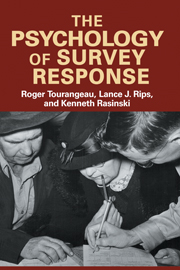Book contents
- Frontmatter
- Contents
- Preface
- 1 An Introduction and a Point of View
- 2 Respondents' Understanding of Survey Questions
- 3 The Role of Memory in Survey Responding
- 4 Answering Questions about Dates and Durations
- 5 Factual Judgments and Numerical Estimates
- 6 Attitude Questions
- 7 Attitude Judgments and Context Effects
- 8 Selecting a Response: Mapping Judgments to Survey Answers
- 9 Editing of Responses: Reporting about Sensitive Topics
- 10 Mode of Data Collection
- 11 Impact of Cognitive Models on Survey Measurement
- References
- Author Index
- Subject Index
4 - Answering Questions about Dates and Durations
Published online by Cambridge University Press: 05 June 2012
- Frontmatter
- Contents
- Preface
- 1 An Introduction and a Point of View
- 2 Respondents' Understanding of Survey Questions
- 3 The Role of Memory in Survey Responding
- 4 Answering Questions about Dates and Durations
- 5 Factual Judgments and Numerical Estimates
- 6 Attitude Questions
- 7 Attitude Judgments and Context Effects
- 8 Selecting a Response: Mapping Judgments to Survey Answers
- 9 Editing of Responses: Reporting about Sensitive Topics
- 10 Mode of Data Collection
- 11 Impact of Cognitive Models on Survey Measurement
- References
- Author Index
- Subject Index
Summary
A glance at several national surveys reveals a large number of questions that ask respondents about the time of an event. For example, the National Crime Survey asks Question (1) for each crime victimization that the respondent reports:
(1) In what month did (this/the first) incident happen? (Show calendar if necessary. Encourage respondent to give exact month.) [NCS]
We presented similar questions in Chapter 3. Equally common are questions, such as (2), concerning the duration of a state or event:
(2) How much time did you lose because of injuries? [NCS]
These probes for a time point or duration, common as they are, aren't the only questions that require respondents to consider when or how long ago events occurred. Many survey items specify a reference period and ask whether or not an event of a given type occurred within it, or they specify a duration and ask whether an event or state lasted for a longer or shorter time. In answering Questions (3) and (4), for example, a respondent doesn't have to supply a date or duration but must still determine the time of the occurrence or the length of time:
(3) Did the accident happen during the past 2 years or before that time? [HIS]
(4) IF RETIRED, IN SCHOOL, KEEPING HOUSE, OR OTHER: Did you ever work for as long as one year? [GSS]
- Type
- Chapter
- Information
- The Psychology of Survey Response , pp. 100 - 135Publisher: Cambridge University PressPrint publication year: 2000



